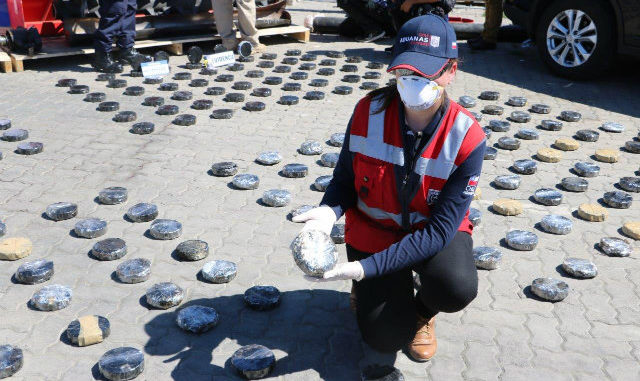
VITOR QUARANTA
SANTIAGO – This week, Chile’s National Customs Services, the Investigative Police (PDI) and the Valparaiso’s Regional Prosecutor Office confiscated 148 kilograms of cocaine paste in a joint operation at the ports of Valparaiso and San Antonio.
The seizure was accomplished based on several months of analysis and intelligence work.
The joint operation, developed with the Department of Drugs Inspection of the Customs Services, alerted the authorities about a specific kind of seaway exportation with a high degree of risk of containing drugs.

As a result, two shipments that departed from the ports of San Antonio and Valparaíso – one destined for Europe and another for Canada – were intercepted. Based on this risk analysis, the physical revision of these was coordinated with the San Antonio and Valparaíso Customs Offices.
The first shipment was located at the Port of San Antonio, and was subjected to the revision of the Customs scanner truck. Images revealed irregular shapes in the structure, so the physical revision was carried out, which lasted several hours due to the fact that a metallic structure had to be intervened.
That led to the discovery of 160 packages of a substance that, when subjected to field tests, confirmed positive for cocaine paste, with a total weight of 81 kilograms 662 grams.
Meanwhile, using the same risk profiles through the analysis work detected a second container, this time leaving the country through the port of Valparaíso. The merchandise was hidden under similar conditions and the count yielded 128 packages containing 66 kilos 968 grams of cocaine paste.
Both seizures were valued at around US$2.5 million.
Chilean police seize $12 million worth of cocaine in drug bust
The Deputy Director of Customs Enforcement, Javier Uribe, stressed that “this finding is the product of a meticulous work involving three institutions, which highlights the work of analysis that our drug units have reached based on the risk profiles of organizations that they use sophisticated concealment methods to achieve exporting drugs to other countries.”
“This specific case required a lot of time and documentation review, but at the same time our non-invasive technology had to be deployed to review the containers. This, undoubtedly, accounts for the level of preparedness that our operating units have reached.”
For his part, the Chief of the Region V of the PDI, Prefect Inspector Sergio Muñoz, added that “without a doubt it is a great success that comes to culminate a work of months, in close collaboration with the Public Ministry and with Customs, with who have done joint analysis to end this diligence that takes out of circulation a large amount of drugs that was destined to arrive abroad.”
Colombia seizes 12 tons of cocaine in largest-ever drug bust (VIDEO, PICS)
Meanwhile, the Prosecutor of the Regional Anti-narcotics Unit of the Regional Prosecutor’s Office of Valparaíso, Víctor Ávila, explained that “an investigation was initiated at the end of last year and a group of people from Chile who were exporting drugs to Canada and Europe were identified”.
In that sense, he added, a series of intrusive measures were requested from the San Antonio Court of Guarantee, which allowed the identification of Chilean and Colombian citizens who were participating in this organization and which led to its dismantling last Friday.
Chile, Bolivia, and Argentina seize 2.2 tons of drugs in joint border raids
These seizures are among the largest so far in 2018 by the National Customs Service and add to the figures of findings made during 2017, which in total reached more than 3 tons: 629 kilos of cocaine base paste; 1,639 kilos of cocaine hydrochloride and 833 kilos of marijuana, all of the above valued at more than 8 billion Chilean pesos.



